The Travel and Tourism Business Toolkit
VerifiedAdded on 2022/12/30
|12
|3835
|65
AI Summary
This report provides a comprehensive study material on travel and tourism management, including revenue management, HR life cycle, performance management, legislation, and financial statement reporting. It focuses on the principles and application of revenue management in the travel and tourism industry, stages of HR life cycle in tourism job roles, performance management plan, and techniques to overcome negative behavior and staff retention.
Contribute Materials
Your contribution can guide someone’s learning journey. Share your
documents today.
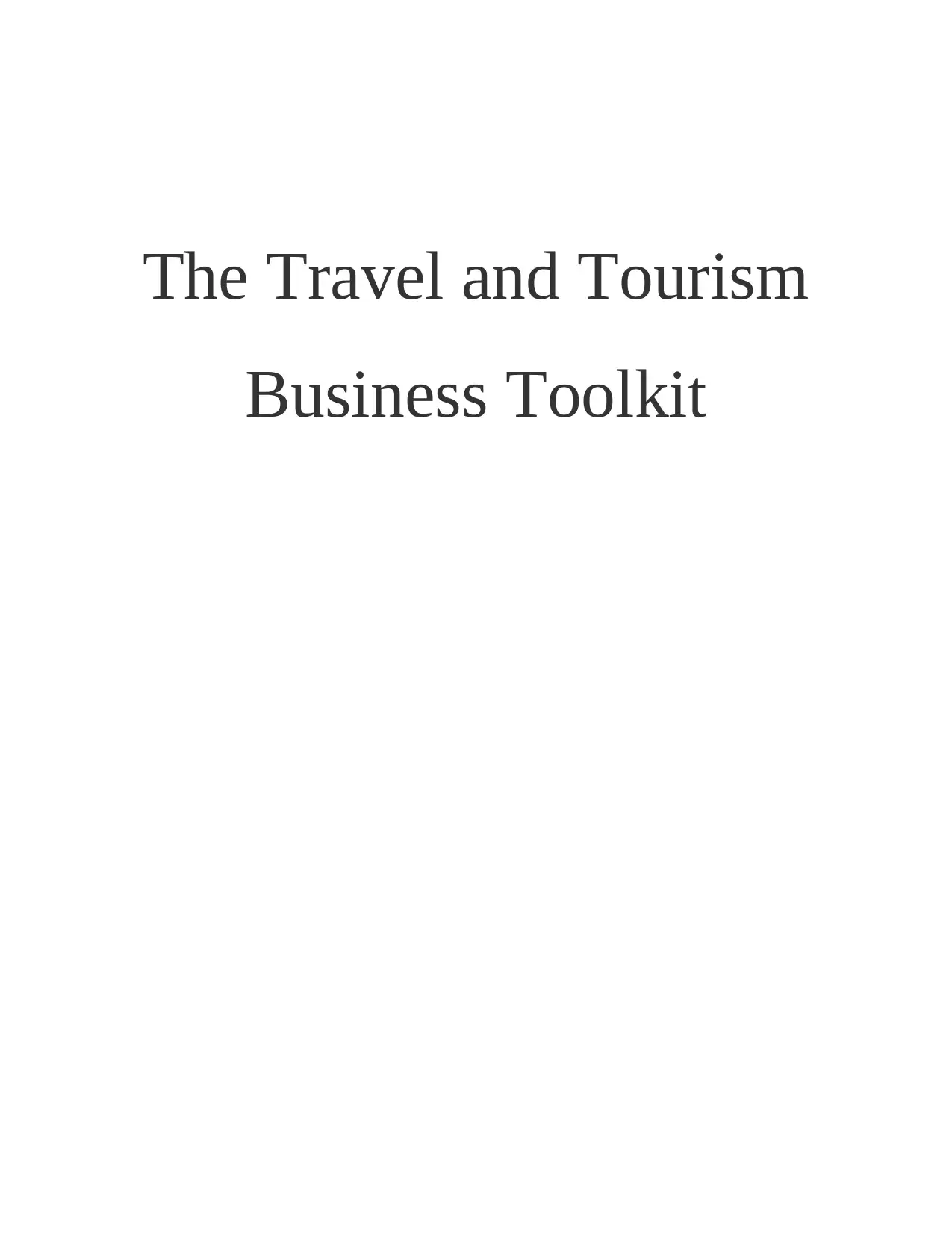
The Travel and Tourism
Business Toolkit
Business Toolkit
Secure Best Marks with AI Grader
Need help grading? Try our AI Grader for instant feedback on your assignments.
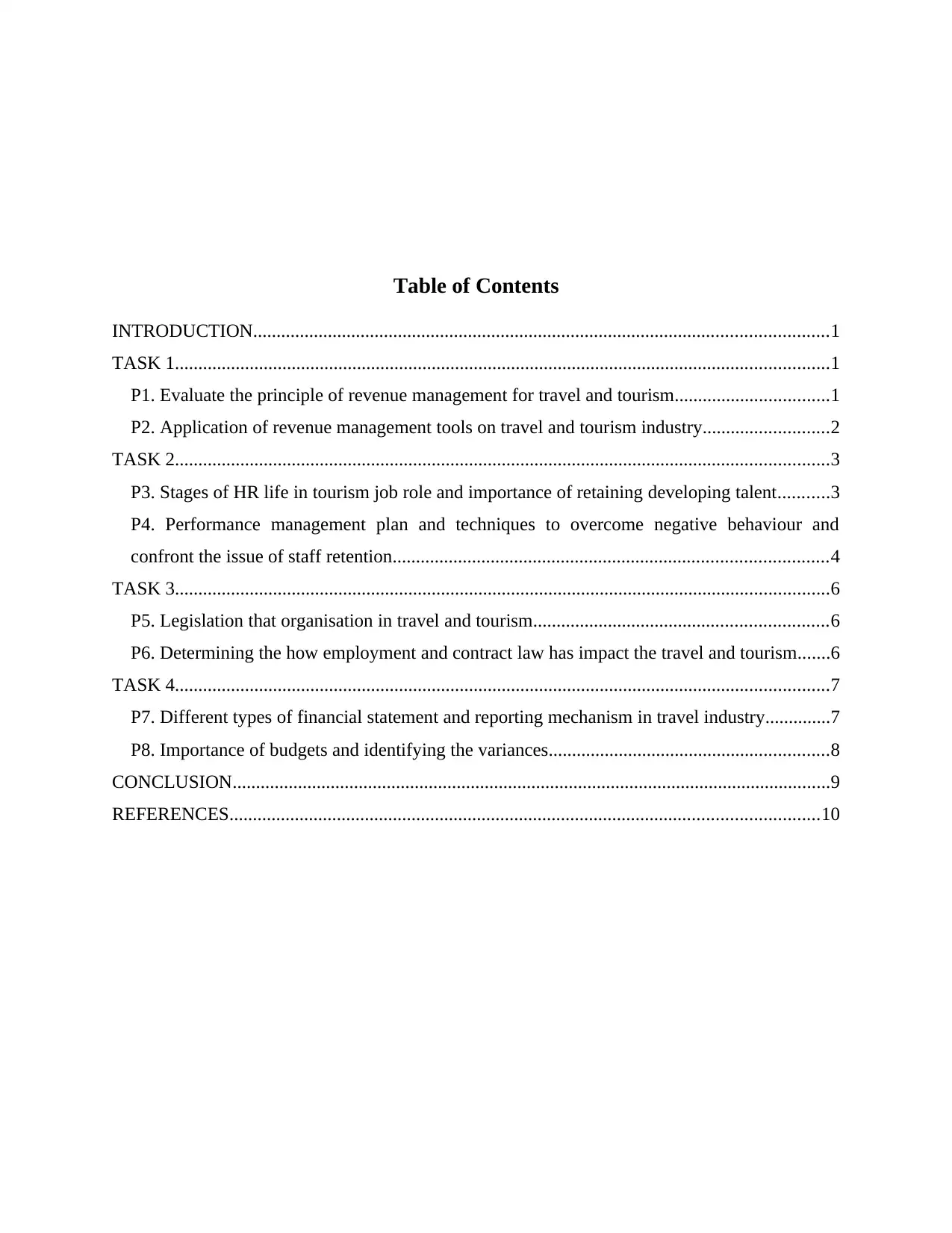
Table of Contents
INTRODUCTION...........................................................................................................................1
TASK 1............................................................................................................................................1
P1. Evaluate the principle of revenue management for travel and tourism.................................1
P2. Application of revenue management tools on travel and tourism industry...........................2
TASK 2............................................................................................................................................3
P3. Stages of HR life in tourism job role and importance of retaining developing talent...........3
P4. Performance management plan and techniques to overcome negative behaviour and
confront the issue of staff retention.............................................................................................4
TASK 3............................................................................................................................................6
P5. Legislation that organisation in travel and tourism...............................................................6
P6. Determining the how employment and contract law has impact the travel and tourism.......6
TASK 4............................................................................................................................................7
P7. Different types of financial statement and reporting mechanism in travel industry..............7
P8. Importance of budgets and identifying the variances............................................................8
CONCLUSION................................................................................................................................9
REFERENCES..............................................................................................................................10
INTRODUCTION...........................................................................................................................1
TASK 1............................................................................................................................................1
P1. Evaluate the principle of revenue management for travel and tourism.................................1
P2. Application of revenue management tools on travel and tourism industry...........................2
TASK 2............................................................................................................................................3
P3. Stages of HR life in tourism job role and importance of retaining developing talent...........3
P4. Performance management plan and techniques to overcome negative behaviour and
confront the issue of staff retention.............................................................................................4
TASK 3............................................................................................................................................6
P5. Legislation that organisation in travel and tourism...............................................................6
P6. Determining the how employment and contract law has impact the travel and tourism.......6
TASK 4............................................................................................................................................7
P7. Different types of financial statement and reporting mechanism in travel industry..............7
P8. Importance of budgets and identifying the variances............................................................8
CONCLUSION................................................................................................................................9
REFERENCES..............................................................................................................................10
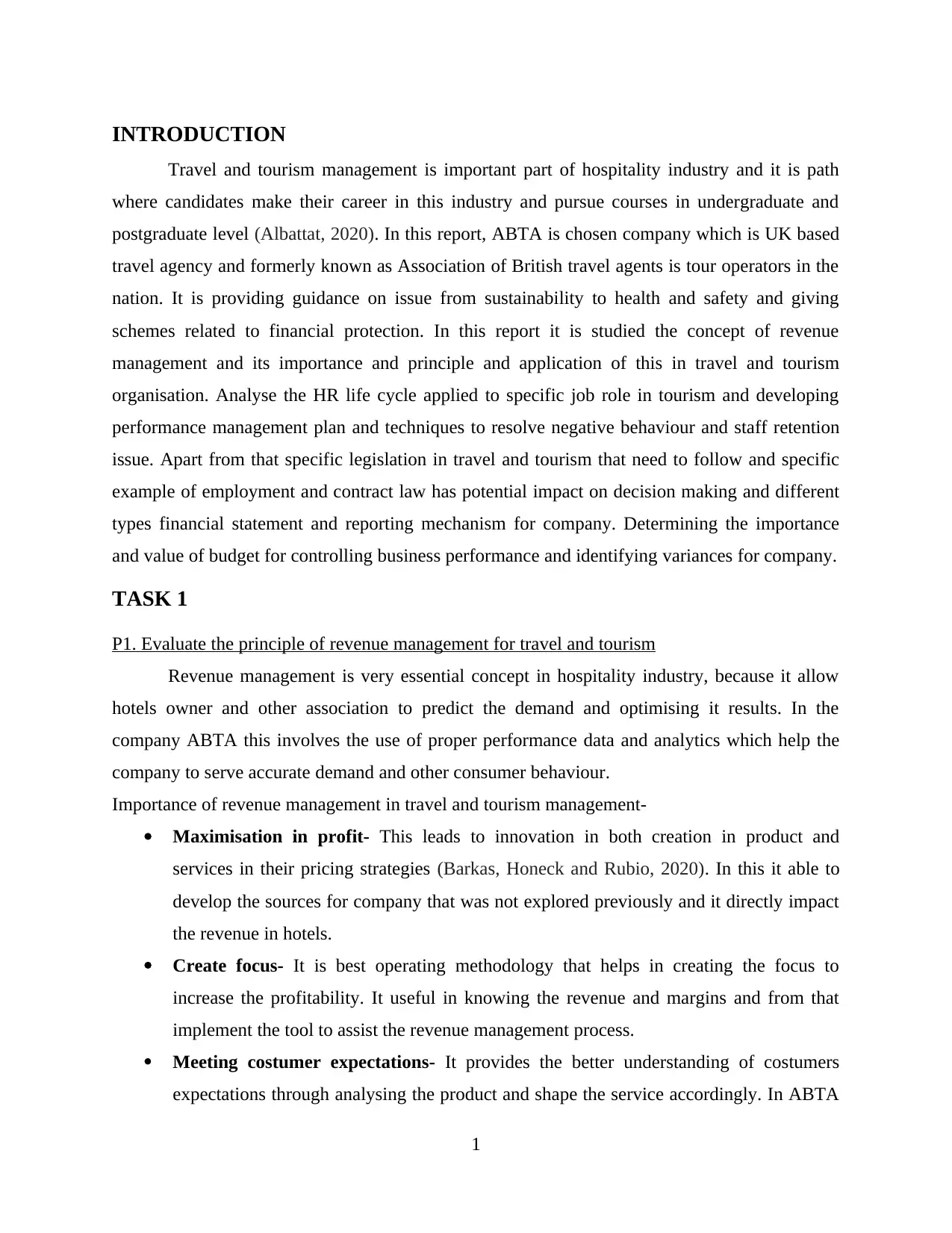
INTRODUCTION
Travel and tourism management is important part of hospitality industry and it is path
where candidates make their career in this industry and pursue courses in undergraduate and
postgraduate level (Albattat, 2020). In this report, ABTA is chosen company which is UK based
travel agency and formerly known as Association of British travel agents is tour operators in the
nation. It is providing guidance on issue from sustainability to health and safety and giving
schemes related to financial protection. In this report it is studied the concept of revenue
management and its importance and principle and application of this in travel and tourism
organisation. Analyse the HR life cycle applied to specific job role in tourism and developing
performance management plan and techniques to resolve negative behaviour and staff retention
issue. Apart from that specific legislation in travel and tourism that need to follow and specific
example of employment and contract law has potential impact on decision making and different
types financial statement and reporting mechanism for company. Determining the importance
and value of budget for controlling business performance and identifying variances for company.
TASK 1
P1. Evaluate the principle of revenue management for travel and tourism
Revenue management is very essential concept in hospitality industry, because it allow
hotels owner and other association to predict the demand and optimising it results. In the
company ABTA this involves the use of proper performance data and analytics which help the
company to serve accurate demand and other consumer behaviour.
Importance of revenue management in travel and tourism management-
Maximisation in profit- This leads to innovation in both creation in product and
services in their pricing strategies (Barkas, Honeck and Rubio, 2020). In this it able to
develop the sources for company that was not explored previously and it directly impact
the revenue in hotels.
Create focus- It is best operating methodology that helps in creating the focus to
increase the profitability. It useful in knowing the revenue and margins and from that
implement the tool to assist the revenue management process.
Meeting costumer expectations- It provides the better understanding of costumers
expectations through analysing the product and shape the service accordingly. In ABTA
1
Travel and tourism management is important part of hospitality industry and it is path
where candidates make their career in this industry and pursue courses in undergraduate and
postgraduate level (Albattat, 2020). In this report, ABTA is chosen company which is UK based
travel agency and formerly known as Association of British travel agents is tour operators in the
nation. It is providing guidance on issue from sustainability to health and safety and giving
schemes related to financial protection. In this report it is studied the concept of revenue
management and its importance and principle and application of this in travel and tourism
organisation. Analyse the HR life cycle applied to specific job role in tourism and developing
performance management plan and techniques to resolve negative behaviour and staff retention
issue. Apart from that specific legislation in travel and tourism that need to follow and specific
example of employment and contract law has potential impact on decision making and different
types financial statement and reporting mechanism for company. Determining the importance
and value of budget for controlling business performance and identifying variances for company.
TASK 1
P1. Evaluate the principle of revenue management for travel and tourism
Revenue management is very essential concept in hospitality industry, because it allow
hotels owner and other association to predict the demand and optimising it results. In the
company ABTA this involves the use of proper performance data and analytics which help the
company to serve accurate demand and other consumer behaviour.
Importance of revenue management in travel and tourism management-
Maximisation in profit- This leads to innovation in both creation in product and
services in their pricing strategies (Barkas, Honeck and Rubio, 2020). In this it able to
develop the sources for company that was not explored previously and it directly impact
the revenue in hotels.
Create focus- It is best operating methodology that helps in creating the focus to
increase the profitability. It useful in knowing the revenue and margins and from that
implement the tool to assist the revenue management process.
Meeting costumer expectations- It provides the better understanding of costumers
expectations through analysing the product and shape the service accordingly. In ABTA
1
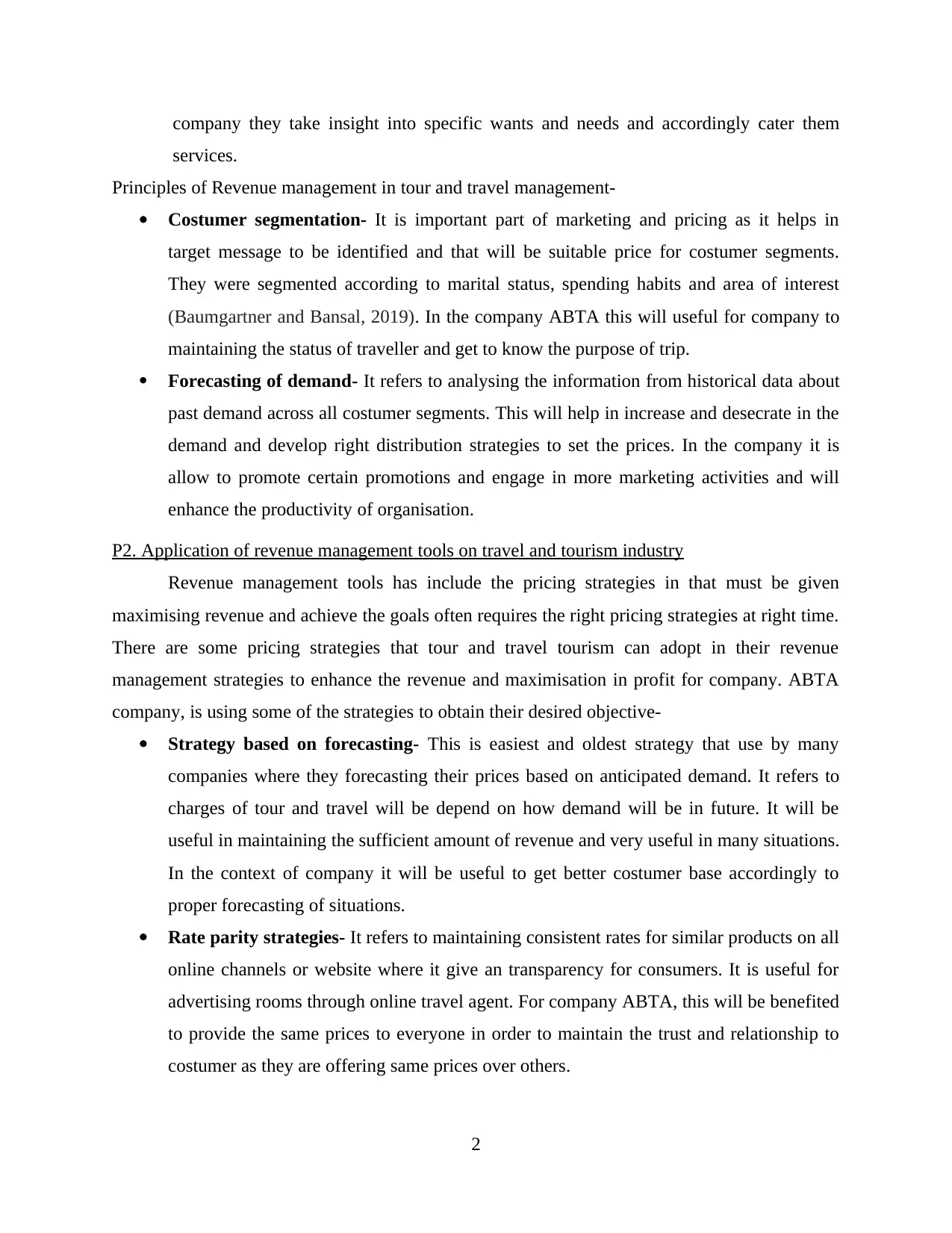
company they take insight into specific wants and needs and accordingly cater them
services.
Principles of Revenue management in tour and travel management-
Costumer segmentation- It is important part of marketing and pricing as it helps in
target message to be identified and that will be suitable price for costumer segments.
They were segmented according to marital status, spending habits and area of interest
(Baumgartner and Bansal, 2019). In the company ABTA this will useful for company to
maintaining the status of traveller and get to know the purpose of trip.
Forecasting of demand- It refers to analysing the information from historical data about
past demand across all costumer segments. This will help in increase and desecrate in the
demand and develop right distribution strategies to set the prices. In the company it is
allow to promote certain promotions and engage in more marketing activities and will
enhance the productivity of organisation.
P2. Application of revenue management tools on travel and tourism industry
Revenue management tools has include the pricing strategies in that must be given
maximising revenue and achieve the goals often requires the right pricing strategies at right time.
There are some pricing strategies that tour and travel tourism can adopt in their revenue
management strategies to enhance the revenue and maximisation in profit for company. ABTA
company, is using some of the strategies to obtain their desired objective-
Strategy based on forecasting- This is easiest and oldest strategy that use by many
companies where they forecasting their prices based on anticipated demand. It refers to
charges of tour and travel will be depend on how demand will be in future. It will be
useful in maintaining the sufficient amount of revenue and very useful in many situations.
In the context of company it will be useful to get better costumer base accordingly to
proper forecasting of situations.
Rate parity strategies- It refers to maintaining consistent rates for similar products on all
online channels or website where it give an transparency for consumers. It is useful for
advertising rooms through online travel agent. For company ABTA, this will be benefited
to provide the same prices to everyone in order to maintain the trust and relationship to
costumer as they are offering same prices over others.
2
services.
Principles of Revenue management in tour and travel management-
Costumer segmentation- It is important part of marketing and pricing as it helps in
target message to be identified and that will be suitable price for costumer segments.
They were segmented according to marital status, spending habits and area of interest
(Baumgartner and Bansal, 2019). In the company ABTA this will useful for company to
maintaining the status of traveller and get to know the purpose of trip.
Forecasting of demand- It refers to analysing the information from historical data about
past demand across all costumer segments. This will help in increase and desecrate in the
demand and develop right distribution strategies to set the prices. In the company it is
allow to promote certain promotions and engage in more marketing activities and will
enhance the productivity of organisation.
P2. Application of revenue management tools on travel and tourism industry
Revenue management tools has include the pricing strategies in that must be given
maximising revenue and achieve the goals often requires the right pricing strategies at right time.
There are some pricing strategies that tour and travel tourism can adopt in their revenue
management strategies to enhance the revenue and maximisation in profit for company. ABTA
company, is using some of the strategies to obtain their desired objective-
Strategy based on forecasting- This is easiest and oldest strategy that use by many
companies where they forecasting their prices based on anticipated demand. It refers to
charges of tour and travel will be depend on how demand will be in future. It will be
useful in maintaining the sufficient amount of revenue and very useful in many situations.
In the context of company it will be useful to get better costumer base accordingly to
proper forecasting of situations.
Rate parity strategies- It refers to maintaining consistent rates for similar products on all
online channels or website where it give an transparency for consumers. It is useful for
advertising rooms through online travel agent. For company ABTA, this will be benefited
to provide the same prices to everyone in order to maintain the trust and relationship to
costumer as they are offering same prices over others.
2
Secure Best Marks with AI Grader
Need help grading? Try our AI Grader for instant feedback on your assignments.
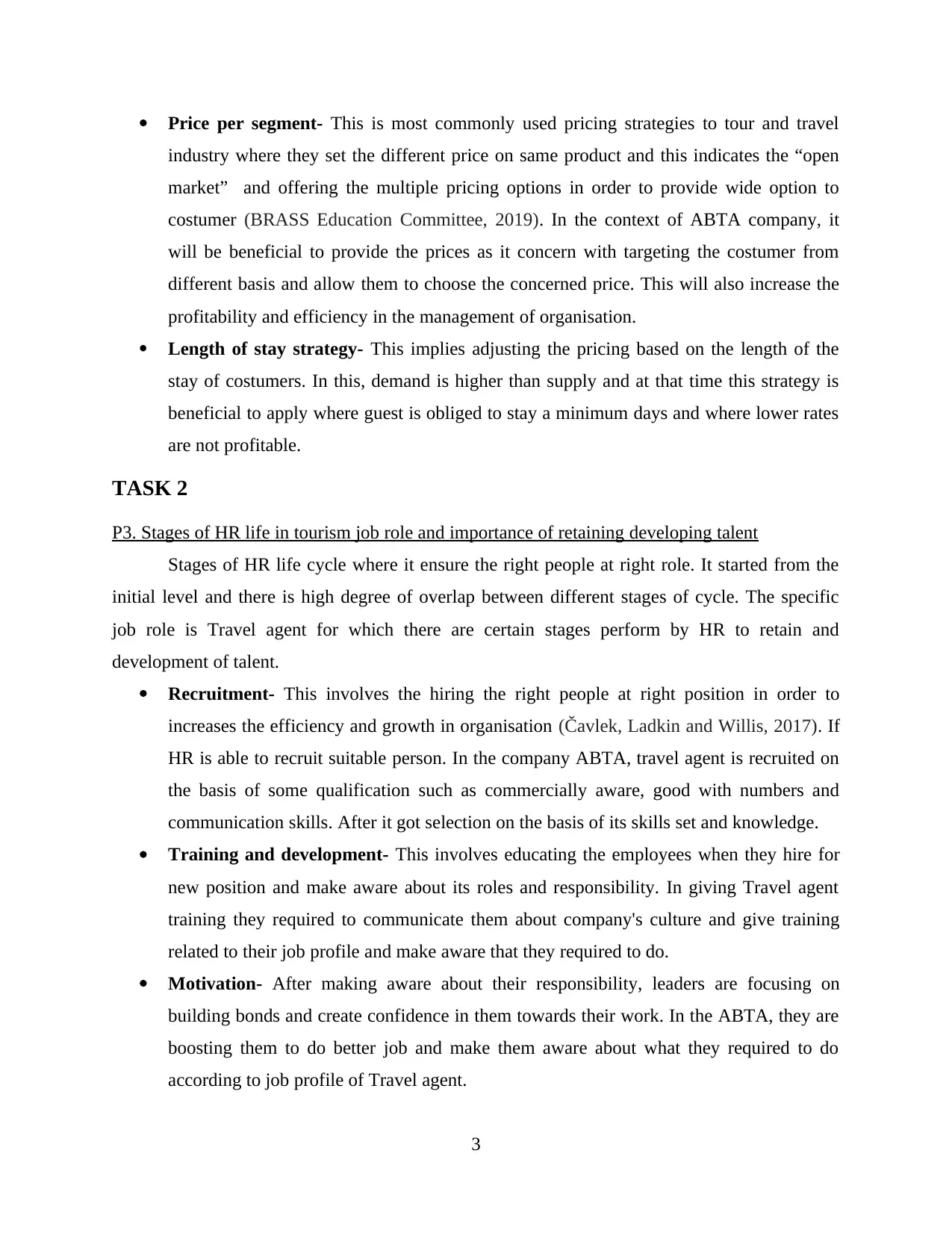
Price per segment- This is most commonly used pricing strategies to tour and travel
industry where they set the different price on same product and this indicates the “open
market” and offering the multiple pricing options in order to provide wide option to
costumer (BRASS Education Committee, 2019). In the context of ABTA company, it
will be beneficial to provide the prices as it concern with targeting the costumer from
different basis and allow them to choose the concerned price. This will also increase the
profitability and efficiency in the management of organisation.
Length of stay strategy- This implies adjusting the pricing based on the length of the
stay of costumers. In this, demand is higher than supply and at that time this strategy is
beneficial to apply where guest is obliged to stay a minimum days and where lower rates
are not profitable.
TASK 2
P3. Stages of HR life in tourism job role and importance of retaining developing talent
Stages of HR life cycle where it ensure the right people at right role. It started from the
initial level and there is high degree of overlap between different stages of cycle. The specific
job role is Travel agent for which there are certain stages perform by HR to retain and
development of talent.
Recruitment- This involves the hiring the right people at right position in order to
increases the efficiency and growth in organisation (Čavlek, Ladkin and Willis, 2017). If
HR is able to recruit suitable person. In the company ABTA, travel agent is recruited on
the basis of some qualification such as commercially aware, good with numbers and
communication skills. After it got selection on the basis of its skills set and knowledge.
Training and development- This involves educating the employees when they hire for
new position and make aware about its roles and responsibility. In giving Travel agent
training they required to communicate them about company's culture and give training
related to their job profile and make aware that they required to do.
Motivation- After making aware about their responsibility, leaders are focusing on
building bonds and create confidence in them towards their work. In the ABTA, they are
boosting them to do better job and make them aware about what they required to do
according to job profile of Travel agent.
3
industry where they set the different price on same product and this indicates the “open
market” and offering the multiple pricing options in order to provide wide option to
costumer (BRASS Education Committee, 2019). In the context of ABTA company, it
will be beneficial to provide the prices as it concern with targeting the costumer from
different basis and allow them to choose the concerned price. This will also increase the
profitability and efficiency in the management of organisation.
Length of stay strategy- This implies adjusting the pricing based on the length of the
stay of costumers. In this, demand is higher than supply and at that time this strategy is
beneficial to apply where guest is obliged to stay a minimum days and where lower rates
are not profitable.
TASK 2
P3. Stages of HR life in tourism job role and importance of retaining developing talent
Stages of HR life cycle where it ensure the right people at right role. It started from the
initial level and there is high degree of overlap between different stages of cycle. The specific
job role is Travel agent for which there are certain stages perform by HR to retain and
development of talent.
Recruitment- This involves the hiring the right people at right position in order to
increases the efficiency and growth in organisation (Čavlek, Ladkin and Willis, 2017). If
HR is able to recruit suitable person. In the company ABTA, travel agent is recruited on
the basis of some qualification such as commercially aware, good with numbers and
communication skills. After it got selection on the basis of its skills set and knowledge.
Training and development- This involves educating the employees when they hire for
new position and make aware about its roles and responsibility. In giving Travel agent
training they required to communicate them about company's culture and give training
related to their job profile and make aware that they required to do.
Motivation- After making aware about their responsibility, leaders are focusing on
building bonds and create confidence in them towards their work. In the ABTA, they are
boosting them to do better job and make them aware about what they required to do
according to job profile of Travel agent.
3
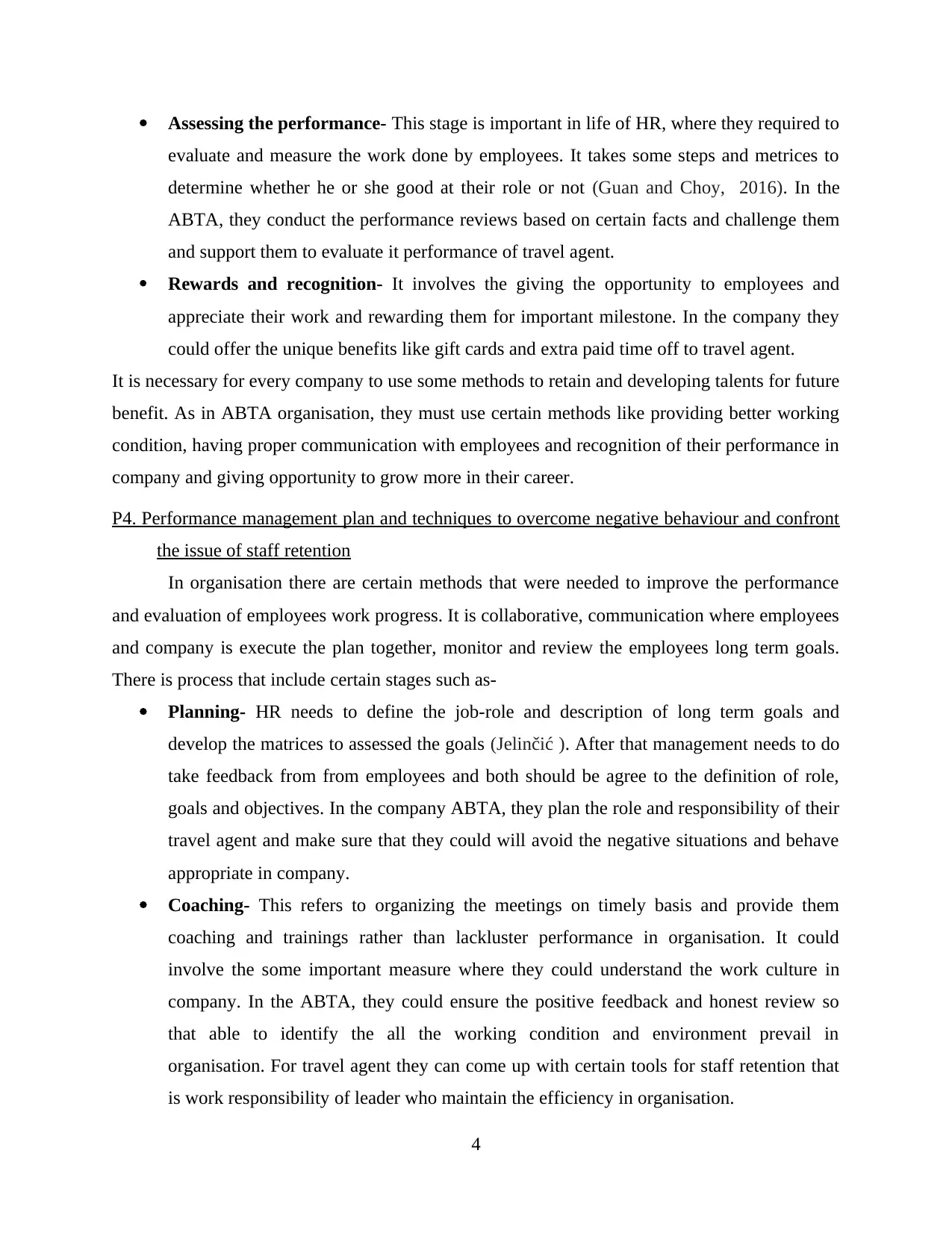
Assessing the performance- This stage is important in life of HR, where they required to
evaluate and measure the work done by employees. It takes some steps and metrices to
determine whether he or she good at their role or not (Guan and Choy, 2016). In the
ABTA, they conduct the performance reviews based on certain facts and challenge them
and support them to evaluate it performance of travel agent.
Rewards and recognition- It involves the giving the opportunity to employees and
appreciate their work and rewarding them for important milestone. In the company they
could offer the unique benefits like gift cards and extra paid time off to travel agent.
It is necessary for every company to use some methods to retain and developing talents for future
benefit. As in ABTA organisation, they must use certain methods like providing better working
condition, having proper communication with employees and recognition of their performance in
company and giving opportunity to grow more in their career.
P4. Performance management plan and techniques to overcome negative behaviour and confront
the issue of staff retention
In organisation there are certain methods that were needed to improve the performance
and evaluation of employees work progress. It is collaborative, communication where employees
and company is execute the plan together, monitor and review the employees long term goals.
There is process that include certain stages such as-
Planning- HR needs to define the job-role and description of long term goals and
develop the matrices to assessed the goals (Jelinčić ). After that management needs to do
take feedback from from employees and both should be agree to the definition of role,
goals and objectives. In the company ABTA, they plan the role and responsibility of their
travel agent and make sure that they could will avoid the negative situations and behave
appropriate in company.
Coaching- This refers to organizing the meetings on timely basis and provide them
coaching and trainings rather than lackluster performance in organisation. It could
involve the some important measure where they could understand the work culture in
company. In the ABTA, they could ensure the positive feedback and honest review so
that able to identify the all the working condition and environment prevail in
organisation. For travel agent they can come up with certain tools for staff retention that
is work responsibility of leader who maintain the efficiency in organisation.
4
evaluate and measure the work done by employees. It takes some steps and metrices to
determine whether he or she good at their role or not (Guan and Choy, 2016). In the
ABTA, they conduct the performance reviews based on certain facts and challenge them
and support them to evaluate it performance of travel agent.
Rewards and recognition- It involves the giving the opportunity to employees and
appreciate their work and rewarding them for important milestone. In the company they
could offer the unique benefits like gift cards and extra paid time off to travel agent.
It is necessary for every company to use some methods to retain and developing talents for future
benefit. As in ABTA organisation, they must use certain methods like providing better working
condition, having proper communication with employees and recognition of their performance in
company and giving opportunity to grow more in their career.
P4. Performance management plan and techniques to overcome negative behaviour and confront
the issue of staff retention
In organisation there are certain methods that were needed to improve the performance
and evaluation of employees work progress. It is collaborative, communication where employees
and company is execute the plan together, monitor and review the employees long term goals.
There is process that include certain stages such as-
Planning- HR needs to define the job-role and description of long term goals and
develop the matrices to assessed the goals (Jelinčić ). After that management needs to do
take feedback from from employees and both should be agree to the definition of role,
goals and objectives. In the company ABTA, they plan the role and responsibility of their
travel agent and make sure that they could will avoid the negative situations and behave
appropriate in company.
Coaching- This refers to organizing the meetings on timely basis and provide them
coaching and trainings rather than lackluster performance in organisation. It could
involve the some important measure where they could understand the work culture in
company. In the ABTA, they could ensure the positive feedback and honest review so
that able to identify the all the working condition and environment prevail in
organisation. For travel agent they can come up with certain tools for staff retention that
is work responsibility of leader who maintain the efficiency in organisation.
4
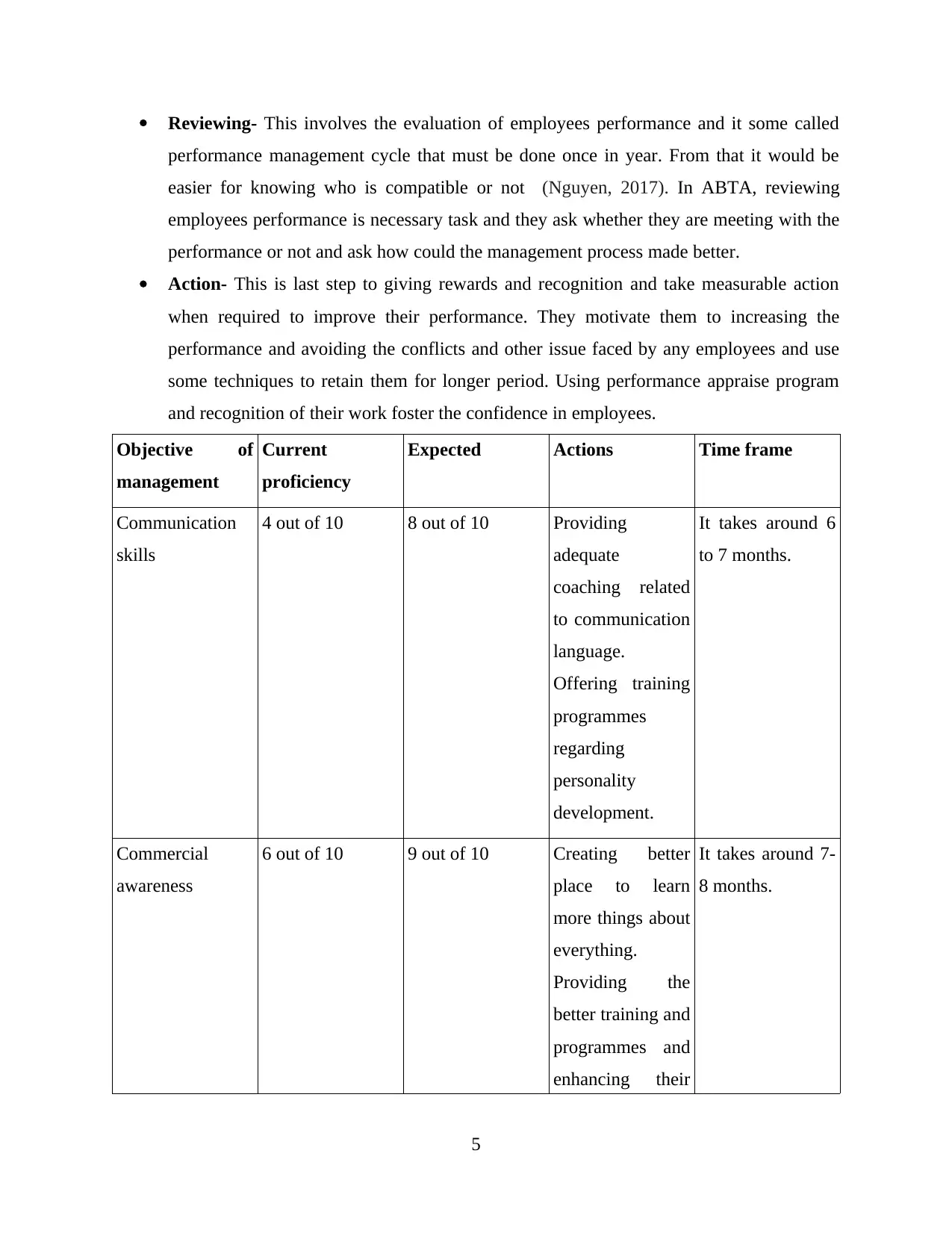
Reviewing- This involves the evaluation of employees performance and it some called
performance management cycle that must be done once in year. From that it would be
easier for knowing who is compatible or not (Nguyen, 2017). In ABTA, reviewing
employees performance is necessary task and they ask whether they are meeting with the
performance or not and ask how could the management process made better.
Action- This is last step to giving rewards and recognition and take measurable action
when required to improve their performance. They motivate them to increasing the
performance and avoiding the conflicts and other issue faced by any employees and use
some techniques to retain them for longer period. Using performance appraise program
and recognition of their work foster the confidence in employees.
Objective of
management
Current
proficiency
Expected Actions Time frame
Communication
skills
4 out of 10 8 out of 10 Providing
adequate
coaching related
to communication
language.
Offering training
programmes
regarding
personality
development.
It takes around 6
to 7 months.
Commercial
awareness
6 out of 10 9 out of 10 Creating better
place to learn
more things about
everything.
Providing the
better training and
programmes and
enhancing their
It takes around 7-
8 months.
5
performance management cycle that must be done once in year. From that it would be
easier for knowing who is compatible or not (Nguyen, 2017). In ABTA, reviewing
employees performance is necessary task and they ask whether they are meeting with the
performance or not and ask how could the management process made better.
Action- This is last step to giving rewards and recognition and take measurable action
when required to improve their performance. They motivate them to increasing the
performance and avoiding the conflicts and other issue faced by any employees and use
some techniques to retain them for longer period. Using performance appraise program
and recognition of their work foster the confidence in employees.
Objective of
management
Current
proficiency
Expected Actions Time frame
Communication
skills
4 out of 10 8 out of 10 Providing
adequate
coaching related
to communication
language.
Offering training
programmes
regarding
personality
development.
It takes around 6
to 7 months.
Commercial
awareness
6 out of 10 9 out of 10 Creating better
place to learn
more things about
everything.
Providing the
better training and
programmes and
enhancing their
It takes around 7-
8 months.
5
Paraphrase This Document
Need a fresh take? Get an instant paraphrase of this document with our AI Paraphraser
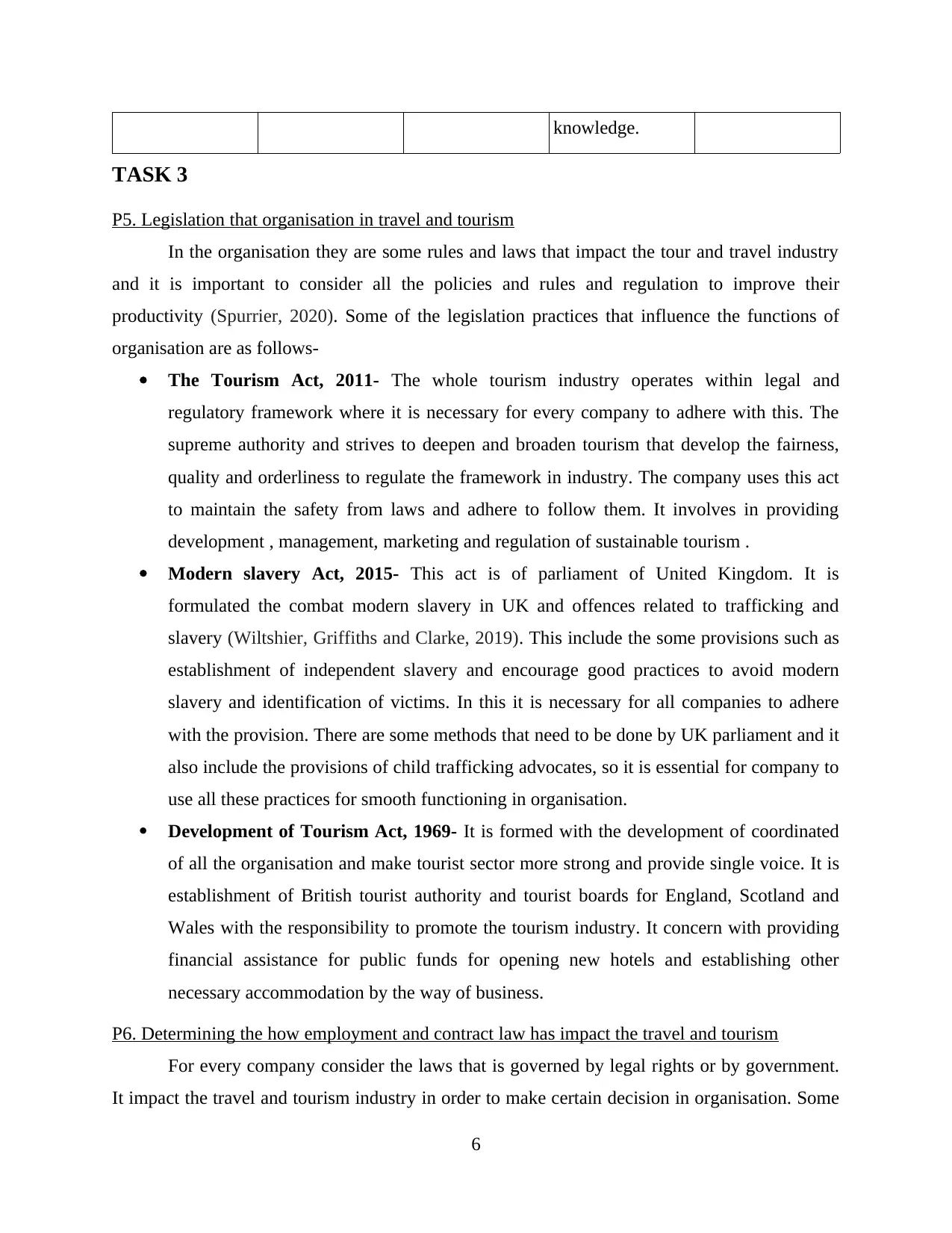
knowledge.
TASK 3
P5. Legislation that organisation in travel and tourism
In the organisation they are some rules and laws that impact the tour and travel industry
and it is important to consider all the policies and rules and regulation to improve their
productivity (Spurrier, 2020). Some of the legislation practices that influence the functions of
organisation are as follows-
The Tourism Act, 2011- The whole tourism industry operates within legal and
regulatory framework where it is necessary for every company to adhere with this. The
supreme authority and strives to deepen and broaden tourism that develop the fairness,
quality and orderliness to regulate the framework in industry. The company uses this act
to maintain the safety from laws and adhere to follow them. It involves in providing
development , management, marketing and regulation of sustainable tourism .
Modern slavery Act, 2015- This act is of parliament of United Kingdom. It is
formulated the combat modern slavery in UK and offences related to trafficking and
slavery (Wiltshier, Griffiths and Clarke, 2019). This include the some provisions such as
establishment of independent slavery and encourage good practices to avoid modern
slavery and identification of victims. In this it is necessary for all companies to adhere
with the provision. There are some methods that need to be done by UK parliament and it
also include the provisions of child trafficking advocates, so it is essential for company to
use all these practices for smooth functioning in organisation.
Development of Tourism Act, 1969- It is formed with the development of coordinated
of all the organisation and make tourist sector more strong and provide single voice. It is
establishment of British tourist authority and tourist boards for England, Scotland and
Wales with the responsibility to promote the tourism industry. It concern with providing
financial assistance for public funds for opening new hotels and establishing other
necessary accommodation by the way of business.
P6. Determining the how employment and contract law has impact the travel and tourism
For every company consider the laws that is governed by legal rights or by government.
It impact the travel and tourism industry in order to make certain decision in organisation. Some
6
TASK 3
P5. Legislation that organisation in travel and tourism
In the organisation they are some rules and laws that impact the tour and travel industry
and it is important to consider all the policies and rules and regulation to improve their
productivity (Spurrier, 2020). Some of the legislation practices that influence the functions of
organisation are as follows-
The Tourism Act, 2011- The whole tourism industry operates within legal and
regulatory framework where it is necessary for every company to adhere with this. The
supreme authority and strives to deepen and broaden tourism that develop the fairness,
quality and orderliness to regulate the framework in industry. The company uses this act
to maintain the safety from laws and adhere to follow them. It involves in providing
development , management, marketing and regulation of sustainable tourism .
Modern slavery Act, 2015- This act is of parliament of United Kingdom. It is
formulated the combat modern slavery in UK and offences related to trafficking and
slavery (Wiltshier, Griffiths and Clarke, 2019). This include the some provisions such as
establishment of independent slavery and encourage good practices to avoid modern
slavery and identification of victims. In this it is necessary for all companies to adhere
with the provision. There are some methods that need to be done by UK parliament and it
also include the provisions of child trafficking advocates, so it is essential for company to
use all these practices for smooth functioning in organisation.
Development of Tourism Act, 1969- It is formed with the development of coordinated
of all the organisation and make tourist sector more strong and provide single voice. It is
establishment of British tourist authority and tourist boards for England, Scotland and
Wales with the responsibility to promote the tourism industry. It concern with providing
financial assistance for public funds for opening new hotels and establishing other
necessary accommodation by the way of business.
P6. Determining the how employment and contract law has impact the travel and tourism
For every company consider the laws that is governed by legal rights or by government.
It impact the travel and tourism industry in order to make certain decision in organisation. Some
6
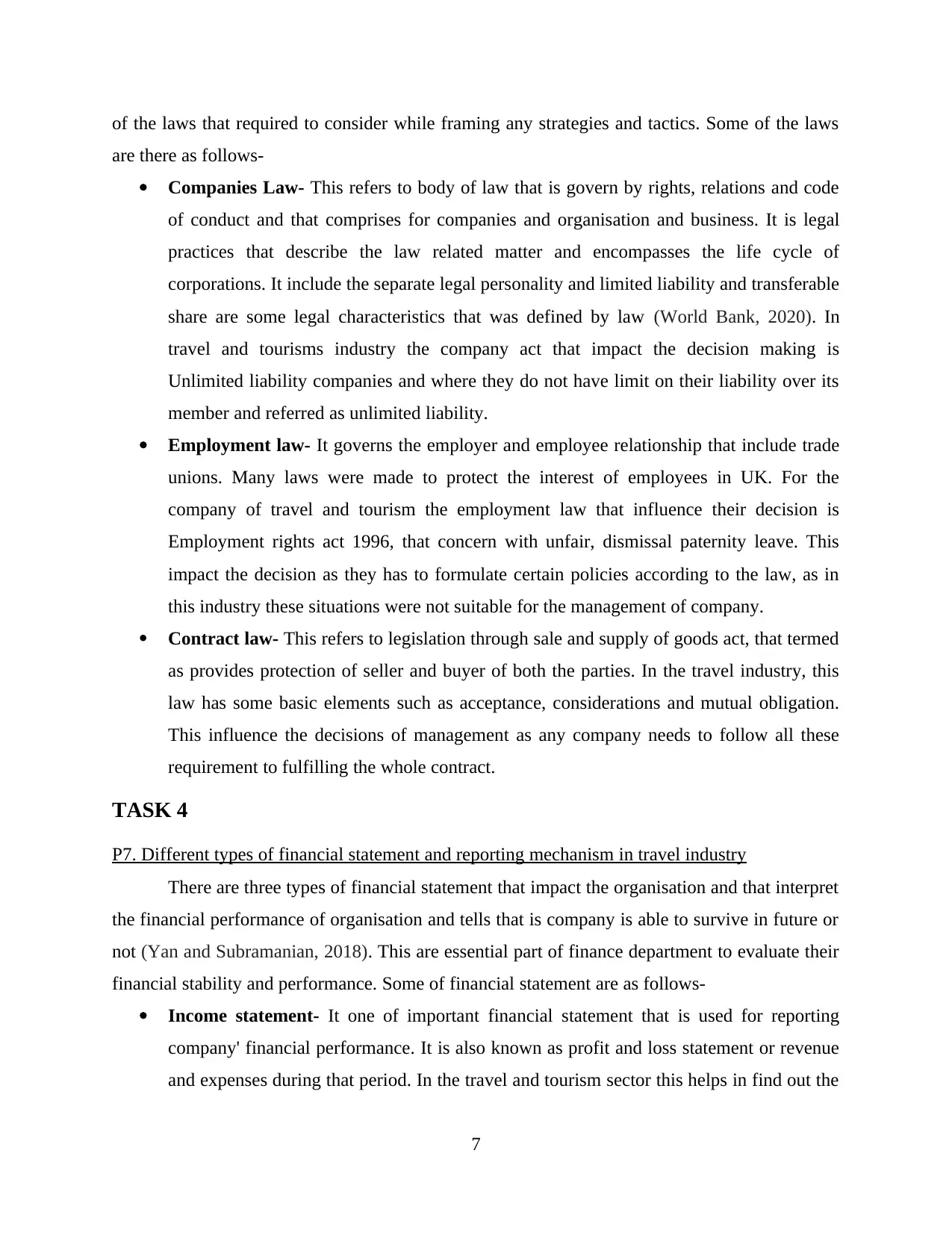
of the laws that required to consider while framing any strategies and tactics. Some of the laws
are there as follows-
Companies Law- This refers to body of law that is govern by rights, relations and code
of conduct and that comprises for companies and organisation and business. It is legal
practices that describe the law related matter and encompasses the life cycle of
corporations. It include the separate legal personality and limited liability and transferable
share are some legal characteristics that was defined by law (World Bank, 2020). In
travel and tourisms industry the company act that impact the decision making is
Unlimited liability companies and where they do not have limit on their liability over its
member and referred as unlimited liability.
Employment law- It governs the employer and employee relationship that include trade
unions. Many laws were made to protect the interest of employees in UK. For the
company of travel and tourism the employment law that influence their decision is
Employment rights act 1996, that concern with unfair, dismissal paternity leave. This
impact the decision as they has to formulate certain policies according to the law, as in
this industry these situations were not suitable for the management of company.
Contract law- This refers to legislation through sale and supply of goods act, that termed
as provides protection of seller and buyer of both the parties. In the travel industry, this
law has some basic elements such as acceptance, considerations and mutual obligation.
This influence the decisions of management as any company needs to follow all these
requirement to fulfilling the whole contract.
TASK 4
P7. Different types of financial statement and reporting mechanism in travel industry
There are three types of financial statement that impact the organisation and that interpret
the financial performance of organisation and tells that is company is able to survive in future or
not (Yan and Subramanian, 2018). This are essential part of finance department to evaluate their
financial stability and performance. Some of financial statement are as follows-
Income statement- It one of important financial statement that is used for reporting
company' financial performance. It is also known as profit and loss statement or revenue
and expenses during that period. In the travel and tourism sector this helps in find out the
7
are there as follows-
Companies Law- This refers to body of law that is govern by rights, relations and code
of conduct and that comprises for companies and organisation and business. It is legal
practices that describe the law related matter and encompasses the life cycle of
corporations. It include the separate legal personality and limited liability and transferable
share are some legal characteristics that was defined by law (World Bank, 2020). In
travel and tourisms industry the company act that impact the decision making is
Unlimited liability companies and where they do not have limit on their liability over its
member and referred as unlimited liability.
Employment law- It governs the employer and employee relationship that include trade
unions. Many laws were made to protect the interest of employees in UK. For the
company of travel and tourism the employment law that influence their decision is
Employment rights act 1996, that concern with unfair, dismissal paternity leave. This
impact the decision as they has to formulate certain policies according to the law, as in
this industry these situations were not suitable for the management of company.
Contract law- This refers to legislation through sale and supply of goods act, that termed
as provides protection of seller and buyer of both the parties. In the travel industry, this
law has some basic elements such as acceptance, considerations and mutual obligation.
This influence the decisions of management as any company needs to follow all these
requirement to fulfilling the whole contract.
TASK 4
P7. Different types of financial statement and reporting mechanism in travel industry
There are three types of financial statement that impact the organisation and that interpret
the financial performance of organisation and tells that is company is able to survive in future or
not (Yan and Subramanian, 2018). This are essential part of finance department to evaluate their
financial stability and performance. Some of financial statement are as follows-
Income statement- It one of important financial statement that is used for reporting
company' financial performance. It is also known as profit and loss statement or revenue
and expenses during that period. In the travel and tourism sector this helps in find out the
7
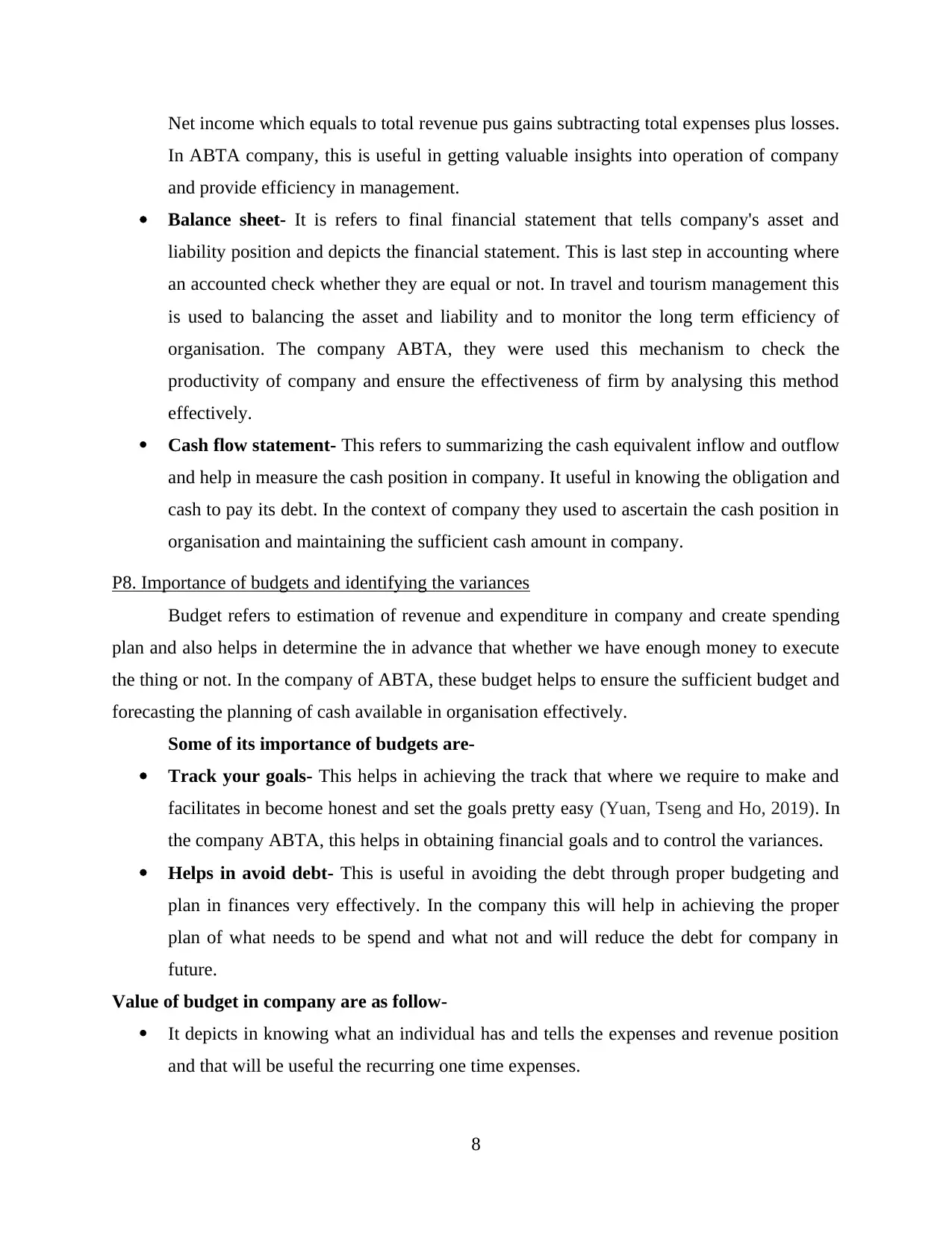
Net income which equals to total revenue pus gains subtracting total expenses plus losses.
In ABTA company, this is useful in getting valuable insights into operation of company
and provide efficiency in management.
Balance sheet- It is refers to final financial statement that tells company's asset and
liability position and depicts the financial statement. This is last step in accounting where
an accounted check whether they are equal or not. In travel and tourism management this
is used to balancing the asset and liability and to monitor the long term efficiency of
organisation. The company ABTA, they were used this mechanism to check the
productivity of company and ensure the effectiveness of firm by analysing this method
effectively.
Cash flow statement- This refers to summarizing the cash equivalent inflow and outflow
and help in measure the cash position in company. It useful in knowing the obligation and
cash to pay its debt. In the context of company they used to ascertain the cash position in
organisation and maintaining the sufficient cash amount in company.
P8. Importance of budgets and identifying the variances
Budget refers to estimation of revenue and expenditure in company and create spending
plan and also helps in determine the in advance that whether we have enough money to execute
the thing or not. In the company of ABTA, these budget helps to ensure the sufficient budget and
forecasting the planning of cash available in organisation effectively.
Some of its importance of budgets are-
Track your goals- This helps in achieving the track that where we require to make and
facilitates in become honest and set the goals pretty easy (Yuan, Tseng and Ho, 2019). In
the company ABTA, this helps in obtaining financial goals and to control the variances.
Helps in avoid debt- This is useful in avoiding the debt through proper budgeting and
plan in finances very effectively. In the company this will help in achieving the proper
plan of what needs to be spend and what not and will reduce the debt for company in
future.
Value of budget in company are as follow-
It depicts in knowing what an individual has and tells the expenses and revenue position
and that will be useful the recurring one time expenses.
8
In ABTA company, this is useful in getting valuable insights into operation of company
and provide efficiency in management.
Balance sheet- It is refers to final financial statement that tells company's asset and
liability position and depicts the financial statement. This is last step in accounting where
an accounted check whether they are equal or not. In travel and tourism management this
is used to balancing the asset and liability and to monitor the long term efficiency of
organisation. The company ABTA, they were used this mechanism to check the
productivity of company and ensure the effectiveness of firm by analysing this method
effectively.
Cash flow statement- This refers to summarizing the cash equivalent inflow and outflow
and help in measure the cash position in company. It useful in knowing the obligation and
cash to pay its debt. In the context of company they used to ascertain the cash position in
organisation and maintaining the sufficient cash amount in company.
P8. Importance of budgets and identifying the variances
Budget refers to estimation of revenue and expenditure in company and create spending
plan and also helps in determine the in advance that whether we have enough money to execute
the thing or not. In the company of ABTA, these budget helps to ensure the sufficient budget and
forecasting the planning of cash available in organisation effectively.
Some of its importance of budgets are-
Track your goals- This helps in achieving the track that where we require to make and
facilitates in become honest and set the goals pretty easy (Yuan, Tseng and Ho, 2019). In
the company ABTA, this helps in obtaining financial goals and to control the variances.
Helps in avoid debt- This is useful in avoiding the debt through proper budgeting and
plan in finances very effectively. In the company this will help in achieving the proper
plan of what needs to be spend and what not and will reduce the debt for company in
future.
Value of budget in company are as follow-
It depicts in knowing what an individual has and tells the expenses and revenue position
and that will be useful the recurring one time expenses.
8
Secure Best Marks with AI Grader
Need help grading? Try our AI Grader for instant feedback on your assignments.
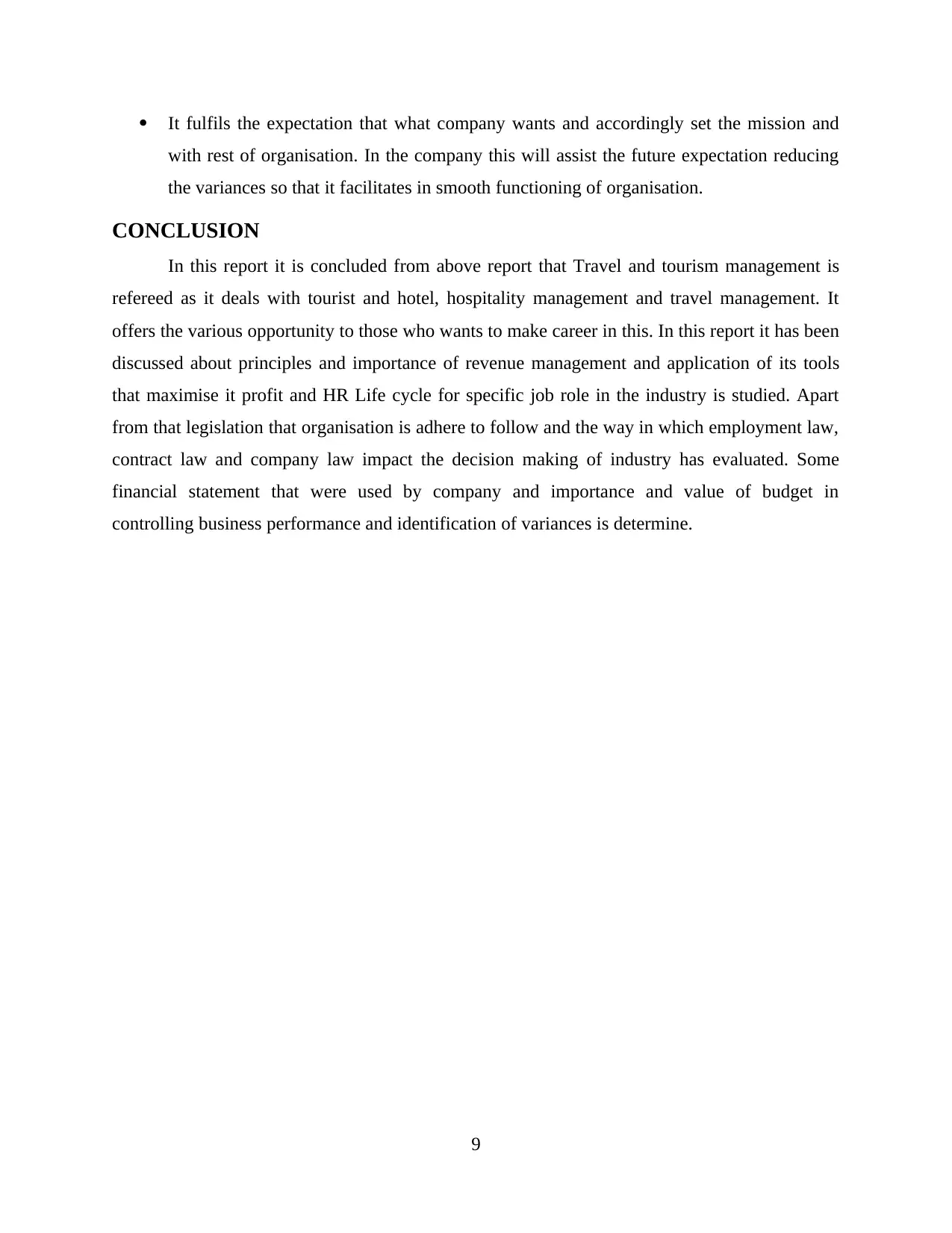
It fulfils the expectation that what company wants and accordingly set the mission and
with rest of organisation. In the company this will assist the future expectation reducing
the variances so that it facilitates in smooth functioning of organisation.
CONCLUSION
In this report it is concluded from above report that Travel and tourism management is
refereed as it deals with tourist and hotel, hospitality management and travel management. It
offers the various opportunity to those who wants to make career in this. In this report it has been
discussed about principles and importance of revenue management and application of its tools
that maximise it profit and HR Life cycle for specific job role in the industry is studied. Apart
from that legislation that organisation is adhere to follow and the way in which employment law,
contract law and company law impact the decision making of industry has evaluated. Some
financial statement that were used by company and importance and value of budget in
controlling business performance and identification of variances is determine.
9
with rest of organisation. In the company this will assist the future expectation reducing
the variances so that it facilitates in smooth functioning of organisation.
CONCLUSION
In this report it is concluded from above report that Travel and tourism management is
refereed as it deals with tourist and hotel, hospitality management and travel management. It
offers the various opportunity to those who wants to make career in this. In this report it has been
discussed about principles and importance of revenue management and application of its tools
that maximise it profit and HR Life cycle for specific job role in the industry is studied. Apart
from that legislation that organisation is adhere to follow and the way in which employment law,
contract law and company law impact the decision making of industry has evaluated. Some
financial statement that were used by company and importance and value of budget in
controlling business performance and identification of variances is determine.
9
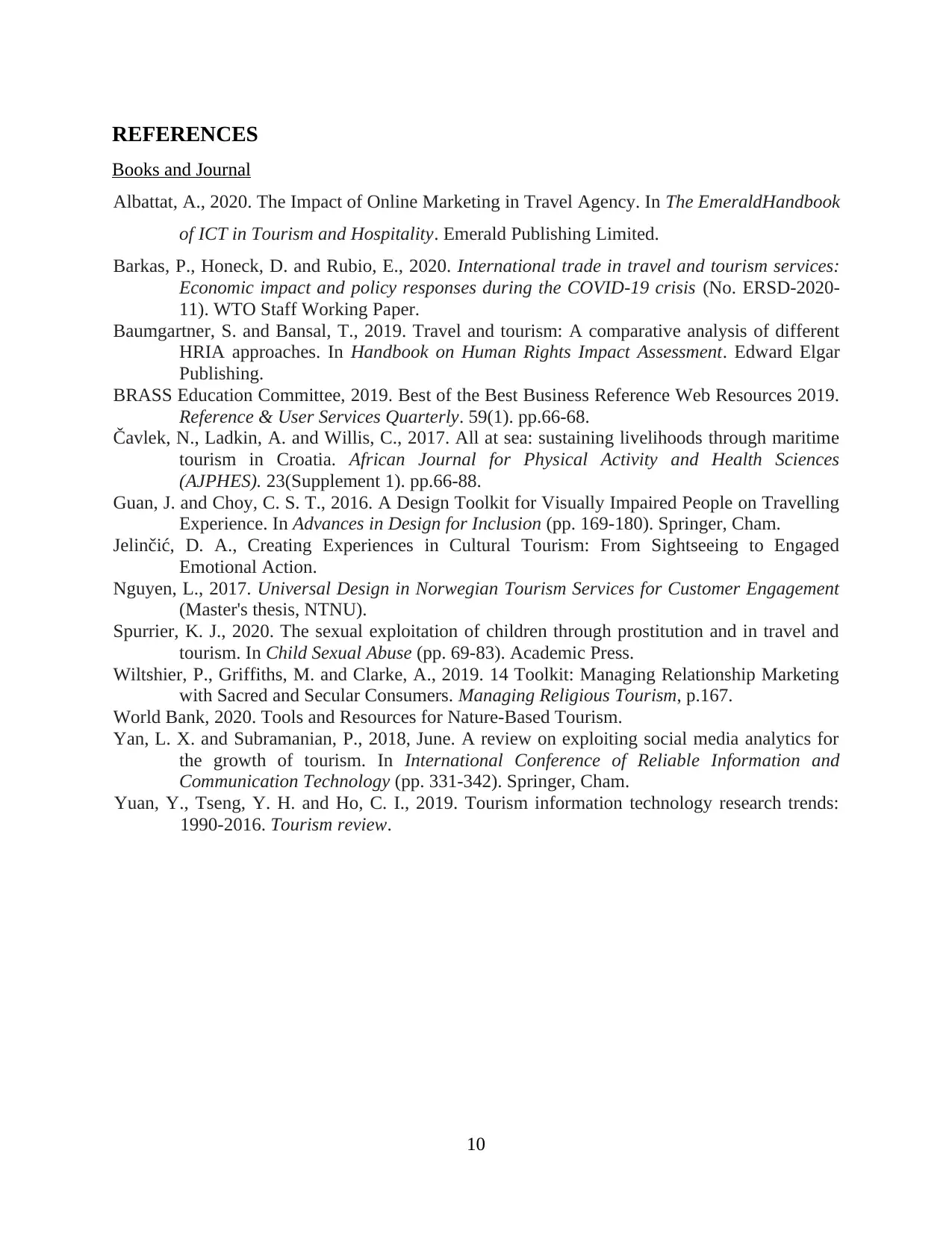
REFERENCES
Books and Journal
Albattat, A., 2020. The Impact of Online Marketing in Travel Agency. In The EmeraldHandbook
of ICT in Tourism and Hospitality. Emerald Publishing Limited.
Barkas, P., Honeck, D. and Rubio, E., 2020. International trade in travel and tourism services:
Economic impact and policy responses during the COVID-19 crisis (No. ERSD-2020-
11). WTO Staff Working Paper.
Baumgartner, S. and Bansal, T., 2019. Travel and tourism: A comparative analysis of different
HRIA approaches. In Handbook on Human Rights Impact Assessment. Edward Elgar
Publishing.
BRASS Education Committee, 2019. Best of the Best Business Reference Web Resources 2019.
Reference & User Services Quarterly. 59(1). pp.66-68.
Čavlek, N., Ladkin, A. and Willis, C., 2017. All at sea: sustaining livelihoods through maritime
tourism in Croatia. African Journal for Physical Activity and Health Sciences
(AJPHES). 23(Supplement 1). pp.66-88.
Guan, J. and Choy, C. S. T., 2016. A Design Toolkit for Visually Impaired People on Travelling
Experience. In Advances in Design for Inclusion (pp. 169-180). Springer, Cham.
Jelinčić, D. A., Creating Experiences in Cultural Tourism: From Sightseeing to Engaged
Emotional Action.
Nguyen, L., 2017. Universal Design in Norwegian Tourism Services for Customer Engagement
(Master's thesis, NTNU).
Spurrier, K. J., 2020. The sexual exploitation of children through prostitution and in travel and
tourism. In Child Sexual Abuse (pp. 69-83). Academic Press.
Wiltshier, P., Griffiths, M. and Clarke, A., 2019. 14 Toolkit: Managing Relationship Marketing
with Sacred and Secular Consumers. Managing Religious Tourism, p.167.
World Bank, 2020. Tools and Resources for Nature-Based Tourism.
Yan, L. X. and Subramanian, P., 2018, June. A review on exploiting social media analytics for
the growth of tourism. In International Conference of Reliable Information and
Communication Technology (pp. 331-342). Springer, Cham.
Yuan, Y., Tseng, Y. H. and Ho, C. I., 2019. Tourism information technology research trends:
1990-2016. Tourism review.
10
Books and Journal
Albattat, A., 2020. The Impact of Online Marketing in Travel Agency. In The EmeraldHandbook
of ICT in Tourism and Hospitality. Emerald Publishing Limited.
Barkas, P., Honeck, D. and Rubio, E., 2020. International trade in travel and tourism services:
Economic impact and policy responses during the COVID-19 crisis (No. ERSD-2020-
11). WTO Staff Working Paper.
Baumgartner, S. and Bansal, T., 2019. Travel and tourism: A comparative analysis of different
HRIA approaches. In Handbook on Human Rights Impact Assessment. Edward Elgar
Publishing.
BRASS Education Committee, 2019. Best of the Best Business Reference Web Resources 2019.
Reference & User Services Quarterly. 59(1). pp.66-68.
Čavlek, N., Ladkin, A. and Willis, C., 2017. All at sea: sustaining livelihoods through maritime
tourism in Croatia. African Journal for Physical Activity and Health Sciences
(AJPHES). 23(Supplement 1). pp.66-88.
Guan, J. and Choy, C. S. T., 2016. A Design Toolkit for Visually Impaired People on Travelling
Experience. In Advances in Design for Inclusion (pp. 169-180). Springer, Cham.
Jelinčić, D. A., Creating Experiences in Cultural Tourism: From Sightseeing to Engaged
Emotional Action.
Nguyen, L., 2017. Universal Design in Norwegian Tourism Services for Customer Engagement
(Master's thesis, NTNU).
Spurrier, K. J., 2020. The sexual exploitation of children through prostitution and in travel and
tourism. In Child Sexual Abuse (pp. 69-83). Academic Press.
Wiltshier, P., Griffiths, M. and Clarke, A., 2019. 14 Toolkit: Managing Relationship Marketing
with Sacred and Secular Consumers. Managing Religious Tourism, p.167.
World Bank, 2020. Tools and Resources for Nature-Based Tourism.
Yan, L. X. and Subramanian, P., 2018, June. A review on exploiting social media analytics for
the growth of tourism. In International Conference of Reliable Information and
Communication Technology (pp. 331-342). Springer, Cham.
Yuan, Y., Tseng, Y. H. and Ho, C. I., 2019. Tourism information technology research trends:
1990-2016. Tourism review.
10
1 out of 12
Related Documents
Your All-in-One AI-Powered Toolkit for Academic Success.
+13062052269
info@desklib.com
Available 24*7 on WhatsApp / Email
![[object Object]](/_next/static/media/star-bottom.7253800d.svg)
Unlock your academic potential
© 2024 | Zucol Services PVT LTD | All rights reserved.





